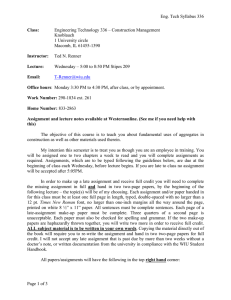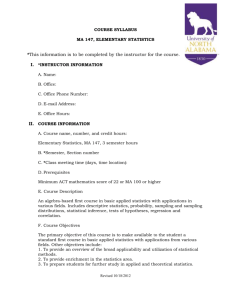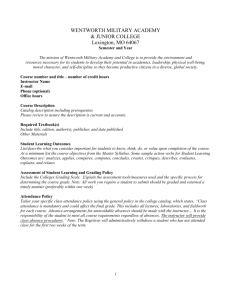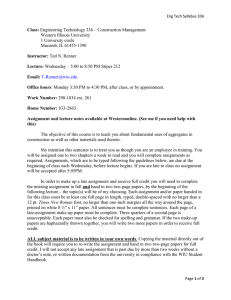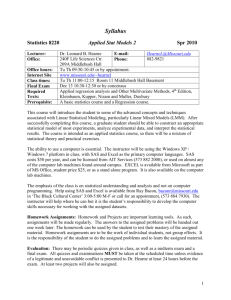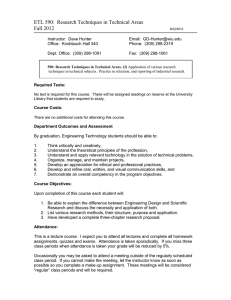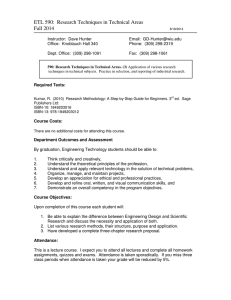ETL 590: Research Techniques in Technical Areas Fall 2015
advertisement
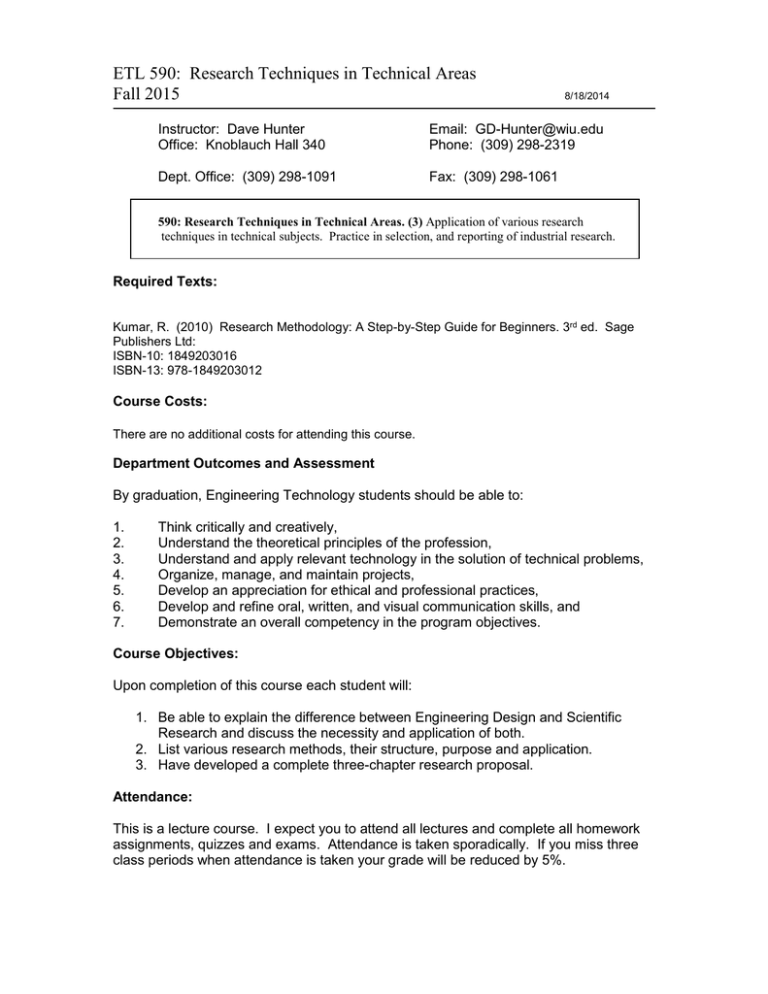
ETL 590: Research Techniques in Technical Areas Fall 2015 8/18/2014 Instructor: Dave Hunter Office: Knoblauch Hall 340 Email: GD-Hunter@wiu.edu Phone: (309) 298-2319 Dept. Office: (309) 298-1091 Fax: (309) 298-1061 590: Research Techniques in Technical Areas. (3) Application of various research techniques in technical subjects. Practice in selection, and reporting of industrial research. Required Texts: Kumar, R. (2010) Research Methodology: A Step-by-Step Guide for Beginners. 3rd ed. Sage Publishers Ltd: ISBN-10: 1849203016 ISBN-13: 978-1849203012 Course Costs: There are no additional costs for attending this course. Department Outcomes and Assessment By graduation, Engineering Technology students should be able to: 1. 2. 3. 4. 5. 6. 7. Think critically and creatively, Understand the theoretical principles of the profession, Understand and apply relevant technology in the solution of technical problems, Organize, manage, and maintain projects, Develop an appreciation for ethical and professional practices, Develop and refine oral, written, and visual communication skills, and Demonstrate an overall competency in the program objectives. Course Objectives: Upon completion of this course each student will: 1. Be able to explain the difference between Engineering Design and Scientific Research and discuss the necessity and application of both. 2. List various research methods, their structure, purpose and application. 3. Have developed a complete three-chapter research proposal. Attendance: This is a lecture course. I expect you to attend all lectures and complete all homework assignments, quizzes and exams. Attendance is taken sporadically. If you miss three class periods when attendance is taken your grade will be reduced by 5%. Occasionally you may be asked to attend a meeting outside of the regularly scheduled class period. If you cannot make the meeting, let the instructor know as soon as possible so you complete a make-up assignment. These meetings will be considered “regular” class periods and will be required. Tardiness is not acceptable and students will be penalized 5% of their final grade if they are late to class three or more times during the semester. Turning in Work: Homework should be turned in at the beginning of class on the due date. Homework may be emailed to me, but it will lose 5% due to printing and stapling. Homework will not be accepted after the due date for any reason. Grades: This course is graded by points. To calculate your grade, divide the total number of points you have accumulated by the total number of points possible. This percentage corresponds to the following: A: 100 – 94 B: 93 – 87 C: 86 – 80 F : 79 - 0 Breakdown of Grade Percentages Portion of Course Grade 1. 2. 3. 4. Attendance Homework Midterm Exam Research proposal 5% 20% 25% 50% INCOMPLETE GRADES A temporary symbol of I (incomplete) for a course may be given only when a student, due to circumstances beyond his or her control, has been unable to complete the course requirements within the official limits of the term. The circumstances must be documented to the instructor’s satisfaction. ACADEMIC INTEGRITY Preamble Western Illinois University, like all communities, functions best when its members treat one another with honesty, fairness, respect, and trust. Students have rights and responsibilities and students should realize that deception for individual gain is an offense against the members of the entire community, and it is the student's responsibility to be informed and to abide by all University regulations and policies on Academic Integrity. (http://www.wiu.edu/provost/students/) Plagiarism, cheating, and other forms of academic dishonesty constitute a serious violation of University conduct regulations. Students who engage in dishonesty in any form shall be charged with academic dishonesty. It is a duty of faculty members to take measures to preserve and transmit the values of the academic community in the learning environment that they create for their students and in their own academic pursuits. To this end, they are expected to instill in their students a respect for integrity and a desire to behave honestly. They are also expected to take measures to discourage student academic dishonesty, to adjust grades appropriately if academic dishonesty is encountered, and, when warranted, to recommend that additional administrative sanctions be considered. Grading policies are the exclusive prerogative of the faculty; administrative sanctions are under the authority of the Director of Student Judicial Programs. This document provides policies and procedures to be followed when academic dishonesty is encountered. Definitions of Academic Dishonesty The following definitions and examples are not meant to be exhaustive. The University reserves the right to determine, in a given instance, what action constitutes a violation of academic integrity. (See www.wiu.edu/policies/acintegrity.php for complete descriptions of the following topics: Plagiarism, Fabrication and Falsification, Cheating, Complicity in Academic Dishonesty, Abuse of Academic Materials, Multiple Submissions Reporting Academic Dishonesty All members of the University community share the responsibility and authority to challenge and make known acts of apparent academic dishonesty. Any student, faculty member, or staff person who has witnessed an apparent act of student academic dishonesty, or has information that reasonably leads to the conclusion that such an act has occurred or has been attempted, has an ethical responsibility for reporting said act(s). Confronting and reporting academic dishonesty can be done in a variety of ways, and people should choose the manner most appropriate for the circumstances. Acts of apparent academic dishonesty that occur in the classroom should be reported directly to the course instructor, and/or the course instructor's Department Chair, and/or the instructor's College Dean. The Council on Admission, Graduation, and Academic Standards (CAGAS) or the Graduate Council will not accept or act upon anonymous reports, but will hold in strict confidence the identity of any person reporting a suspected instance of academic dishonesty, unless that person consents to having his/her identity revealed. ACCESS & DISABILITIES “Students with disabilities: In accordance with University values and disability law, students with disabilities may request academic accommodations where there are asspects of a course that result in barriers to inclusion or accurate assessment of achievement. To file an official request for disabilityrelated accommodations, please contact the Disability Resource Center at 309-298-2512, disability@wiu.edu or in 143 Memorial Hall. Please notify the instructor as soon as possible to ensure that this course is accessible to you in a timely manner. AN ELECTRONIC VERSION of this statement can be found at https://www.wiu.edu/student_services/disability_resource_center/publications/index.php If you have emergency medical information to share with me, if you need special arrangements in case the building must be evacuated, or if you need accommodations in this course because of a disability, please make an appointment with me as soon as possible. My office location and hours are at the top of this syllabus. If you plan to request disability accommodations, you are expected to register with the Disability Support Services (DSS) at 298-2512. RESOLUTION OF PROBLEMS Should a problem occur, students should speak to their instructor first. If the problem is not resolved, meet with the chair of the department. If the problem continues to be unresolved, go to the College of Business and Technology’s Dean. Students should observe the following sequence for the resolution of problems: Student --- Instructor --- Chairperson --- Dean

